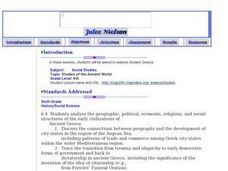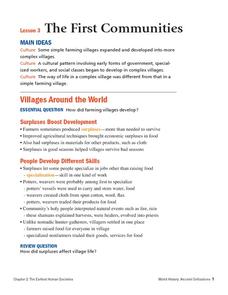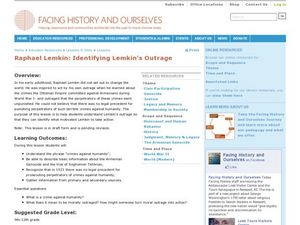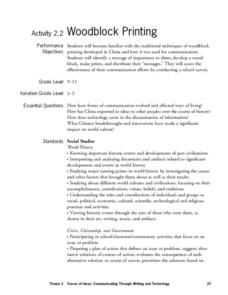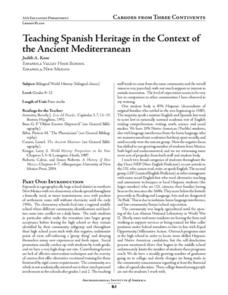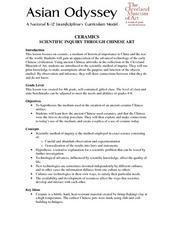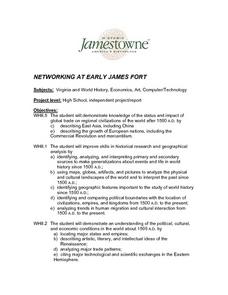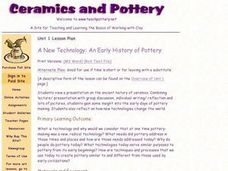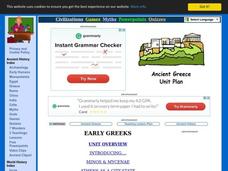Curated OER
Travel Agent to the Ancient World
Students persuade others to visit ancient times. In this ancient civilizations lesson plan, students participate in a webquest that requires them to encourage others to visit ancient Greece, ancient Israel, Ancient Rome, ancient China,...
Curated OER
Studies of the Ancient World
Sixth graders, after taking a pretest, write a paragraph describing the difference between Athens and Sparta and write an article about the ancient Phoenicians, describing their contributions to world history. They compare democracy in...
Weebly
Ancient China
From China's physical geography and earliest beginnings of civilization to the Qin and Han dynasties, here is a nicely designed worksheet on ancient China, which includes a graphic organizer and timeline to summarize the reading...
Curated OER
Empires of Early Africa
Ninth graders examine the Nile's role in the birth and growth of Egyptian civilization. In this World History lesson, 9th graders explore how archaeologists have learned about life in Ancient cities. Students present a report...
Curated OER
Geography and World History
Students build off of their current knowledge of geography and world history, while being introduced to new concepts and ideas.
Curated OER
Four Ancient River Civilizations
Students explore how the environment shapes man, how man transformed his world, nd how art became part of the human process. The group is divided into clans and their migratory routes developed in the eight lessons of this unit.
Global Oneness Project
Architectural Wonders
Angkor Wat, a UNESCO World Heritage Site located in Cambodia, is the focus of a lesson that asks class members to consider factors that could result in the destruction of these archeological treasures. Pupils listen to a...
Houghton Mifflin Harcourt
The First Communities
These documents list essential questions and foundational concepts associated with early civilizations and farming communities in the agricultural revolution. Use this as a starting point for developing specific lessons and activities...
Curated OER
Microbes & History: Microbial influence on the spread of Civilization
Students explore how to extract plant fibers from the flax plant Linum usitatissimum in the process of making linen fibers. Doing so spark interest in the importance of microbial action on the spread of human culture and civilization.
Curated OER
Taking the Mystery Out of Mesopotamia
Students locate Mesopotamia on the map and explain the importance of its location. In this Mesopotamia lesson, students understand why the new discoveries of Mesopotamia were so important to civilization. Students participate in...
Facing History and Ourselves
Raphael Lemkin: Identifying Lemkin's Outrage
Students examine World War I war crimes. For this world history lesson plan, students use primary and secondary sources to research Armenian genocide and the trial of Soghomon Tehlirin.
Curated OER
Woodblock Printing: Early Printing Traditions in China
Students examine important role of woodblock printing in Chinese history, identify message important to them, and create woodblock prints to gain first-hand understanding of how it was used as tool for communication.
Curated OER
Visual Arts:Literature and World Civilization
Fourth graders examine the art of the Middle Ages or Medieval time period through the activities in this unit.
Curated OER
Teaching Spanish Heritage in the Context of the Ancient Mediterranean
Students identify and interpret Spanish heritage, including the Mediterranean culture, language, history, trade, and migration. Following, they began an in-depth study of Egypt, the Middle East, Greece, and Rome and were able to make...
Curated OER
Ceramics Scientific Inquiry Through Chinese Art
Fourth graders explore, examine and study ceramics, a medium of historical importance to China. They review the advanced technology of the early Chinese civilization and are introduced to the scientific method of inquiry and make...
Curated OER
Chapter 10 – Early Islam
In this Islam worksheet, students read assigned textbook pages regarding Muslim beliefs and respond to 50 short answer questions.
Curated OER
The Empires of Early Africa
Students view the video "Empires of Early Africa." They are asked: Who was Nefertiti? They review the facts about Akhenaten and Nefertiti. Students discuss how archaeologists looked for clues to determine the identity of the mummy...
Curated OER
Personal Power Figures
Students create African Personal Power Figure boxes describing how they view themselves and discuss what personal traits are important to the preservation and improvement of a civilization.
Curated OER
Mesoamerica
Students demonstrate knowledge of early Middle American civilizations. They study Mesoamerican i religions, governments, and achievements. They identify geographies of North and South America.
Curated OER
An Ancient Greek and Roman Festival
Third graders label a map of ancient Greek and Roman civilizations and do a written report on one element of these two cultures. They participate in discussions of food, farming, daily life and government (among others). Students use the...
Curated OER
It’s a Big, Big World
Students examine the role of the explorers. In this explorers and conquistadors, students create word puzzles (Wordles) regarding the time period in history. Students conduct research regarding a particular explorer and create foldables...
Curated OER
Networking at Early James Fort
High schoolers examine the impact of global trade on regional civilizations of the world after 1500. They research and analyze images of pottery excavated at Jamestown, and create a poster that presents information about world trade...
Curated OER
A New Technology: An Early History of Pottery
Students view a presentation on the ancient history of ceramics and gain insight into the early days of pottery making. They also reflect on how new technologies change the world.
Curated OER
The Greek Gods
What were the early Greek myths? Have elementary students examine the Persian Wars and read various Greek myth in order to identify the cause and the results of the Persian Wars. Myths, activities, simulations, and a unit plan are links...



